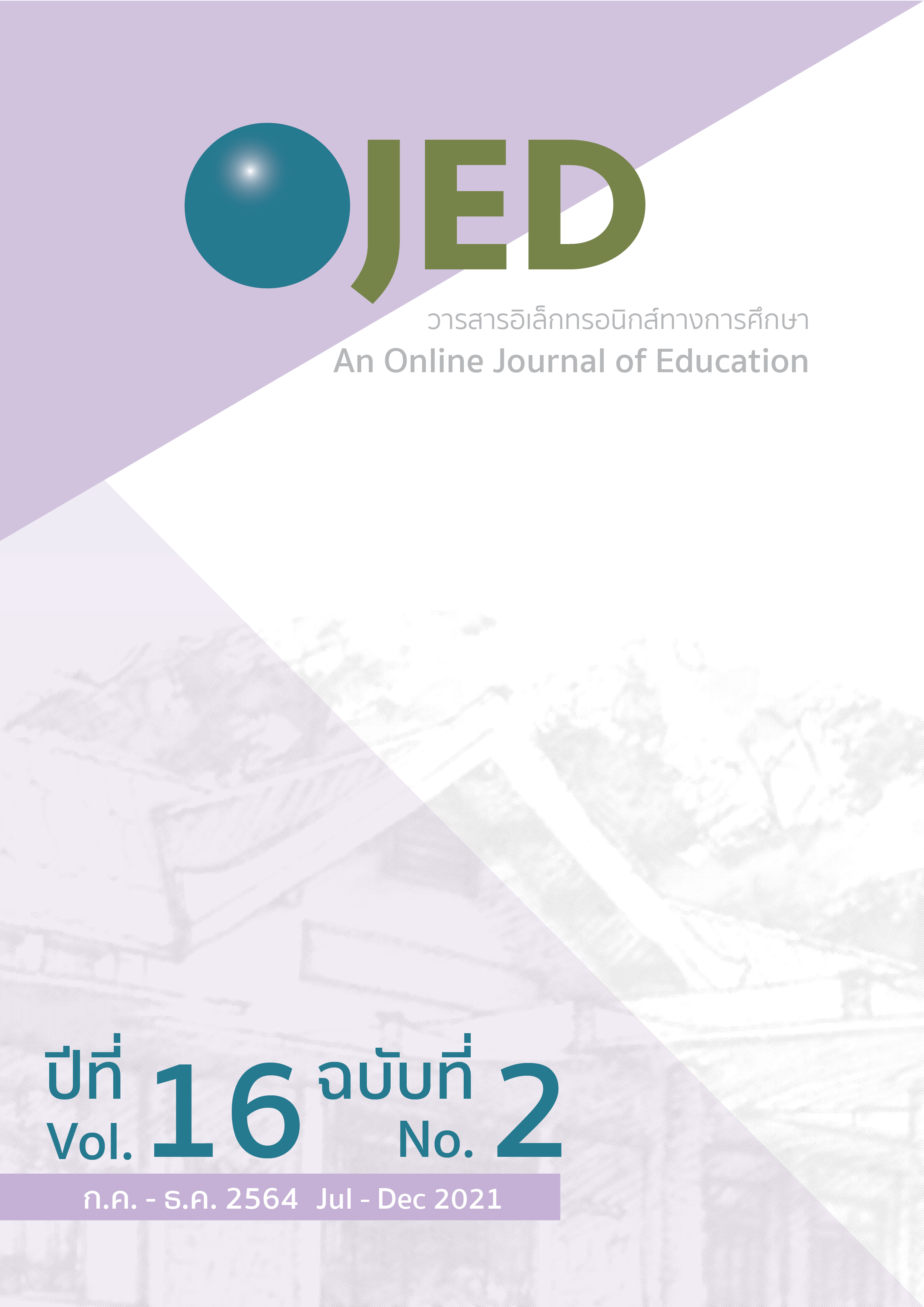Factors Affecting Engagement of Teachers in Thai Language Schools for Foreigners in Bangkok
DOI:
https://doi.org/10.14456/ojed.2021.61Keywords:
level of engagement, factors affecting the engagement, Thai language schools for foreignersAbstract
This research was conducted using a descriptive research method. The objectives of this research were 1) to study the level of engagement of teachers in Thai Language schools for foreigners in Bangkok and 2) to study the factors affecting the engagement of teachers in Thai Language schools for foreigners in Bangkok. The sample of this study consisted of 113 teachers in Thai Language schools for foreigners in Bangkok under The Office of the private education commission. The research instrument used in this study was the 5 level rating scaled questionnaire, 94.69 % of questionnaires were returned. The data was analyzed by frequency distribution, percentage, mean, standard deviation and multiple regression analysis. The finding indicated that 1) the level of engagement of teachers in Thai Language schools for foreigners in Bangkok in term of the overall was practiced at a high level. The highest average was the willingness to exert considerable effort on behalf of organization, followed by the positive speaking to organization, and the lowest mean was the strong desire to maintain membership in the organization. 2) The factors affecting engagement of teachers in Thai Language schools for foreigners in Bangkok at the significant level of .05 included age, salary, job characteristic and quality of work life all 4 variables could predict the engagement of teachers in Thai Language schools for foreigners in Bangkok at 83.5 %
References
ณัฐพงศ์ ชัยปฏิยุทธพงศ์. (2554). ปัจจัยที่ส่งผลต่อความผูกพันในองค์การของเจ้าหน้าที่ตำรวจกองกำกับการควบคุมฝูงชน 2 กองบังคับการอารักขาและควบคุมฝูงชน [วิทยานิพนธ์ปริญญามหาบัณทิต ไม่ได้ตีพิมพ์]. จุฬาลงกรณ์มหาวิทยาลัย.
พิชิต พิทักษ์เทพสมบัติ. (2552). ความพึงพอใจในงานและความผูกพันต่อองค์การ: ความหมายทฤษฏี วิธีวิจัย การวัดและงานวิจัย. สำนักพิมพ์เสมาธรรม.
พิชญ์สินี สุนทรวร. (2549). ปัจจัยที่ส่งผลต่อความผูกพันในองค์การของบุคลากรมหาวิทยาลัยเทคโนโลยีพระจอมเกล้าธนบุรี [วิทยานิพนธ์ปริญญามหาบัณทิต ไม่ได้ตีพิมพ์]. จุฬาลงกรณ์มหาวิทยาลัย.
วัลยา กลิ่นระรวย. (2549). ปัจจัยที่มีอิทธิพลต่อความผูกพันในองค์การของพนักงานศึกษากรณีท่าอากาศยานกรุงเทพและท่าอากาศยานสุวรรณภูมิ บริษัทท่าอากาศยานไทย จำกัด (มหาชน) [วิทยานิพนธ์ปริญญามหาบัณทิต ไม่ได้ตีพิมพ์]. จุฬาลงกรณ์มหาวิทยาลัย.
ศิริชัย กาญจนวาสี. (2544). ทฤษฎีการทดสอบแบบดั้งเดิม. แห่งจุฬาลงกรณ์มหาวิทยาลัย.
รุ่งโรจน์ อรรถานิทธ์. (2554). การสร้างความผูกพันของพนักงานในองค์กร. เอช อาร์ เซนเตอร์.
อาภรณ์ ภู่วิทยพันธุ์. (2554). ความผูกพันบุคลากร. http://www.oknation.net.
AonHewitt. (2013). Trends in global employee engagement. http://www.AonHewitt.com
Best, J. W. (1970). Research in education. Practice Hall.
Gubman, E. (1998). Increasing and measuring engagement. http://gubmanconsulting.com
Hackman, J.R., & Oldham, G.R. (1980). Work redesign. Addison-Wesley Publishing Company.
Kossen, S. (1994). The human side of organization (6th ed.). HarperCollins Collage Publishers.
Lim, G. S., Marthis, R.L. & John H. (2010). Human resource management: An Asia Edition. Cengage Learning Asia Pte Ltd.
Steers, R. (1977). Antecedents and outcomes of organizational commitment. Administrative Science Quarterly, 22, 45-56.
William H. M., Benjamin S., Karen M. B., & Scott A. Y. (2009). Employee engagement tools for analysis, practice, and competitive advantage. John Wiley & Son Ltd.
Downloads
Published
How to Cite
Issue
Section
License

This work is licensed under a Creative Commons Attribution-NonCommercial-NoDerivatives 4.0 International License.




